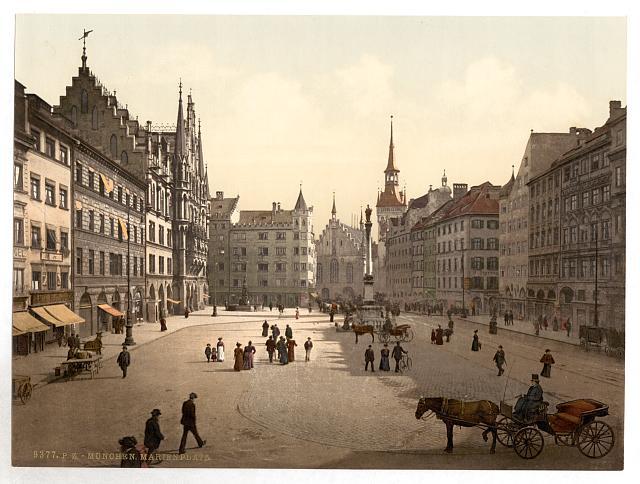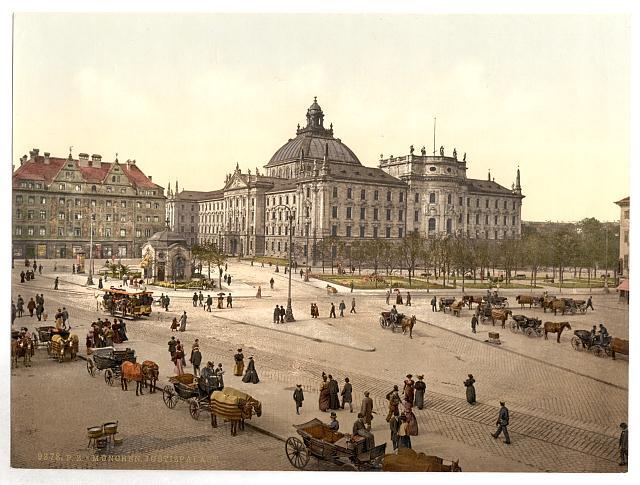Note: This article has been excerpted from a larger work in the public domain and shared here due to its historical value. It may contain outdated ideas and language that do not reflect TOTA’s opinions and beliefs.
From When I Was a Girl in Bavaria, by Bertha Tauber Harper, 1932.
I still fondly remember the long, cozy winter evenings, when, after the day’s tasks were done and the school lessons were conquered, we sat around the table, with a bright lamp in the center. Mother knitted or mended, little sister worked over some puzzle, I busied myself with some fancy work, and Father read aloud to us from the inspiring works of Schiller or Goethe, or acquainted us with the literature of other lands by reading translations from Walter Scott, Dickens, and others. The Amsel, in his covered cage by the window, now and then twittered softly, and the kitten curled up in the workbasket, purring contentedly.
From the walls, the portraits of my distinguished grandparents, the work of my father’s earlier days, looked down upon us benignly. In the corner of the room the tall, brass-trimmed stove of greenish tile gave out its generous heat. These monumental stoves were built into the houses and were the only means of heating before coal and gas came to be commonly used. They reached to the ceiling, as a rule, and were ornamented with plastic figures. Wood and peat were used for fuel.
Our simple, wholesome life, despite all the ups and downs of an artist’s career, despite occasional privations and self-sacrifices, wove indelible threads of affection in my heart, which I felt very keenly when, a few years later, I was temporarily separated from home. I still have a great accumulation of letters from that period, and I am forced to smile at the lengthy effusions of filial love and devotion and at the expressions of longing that were poured forth on thinnest paper. The lines were often written crosswise to save space, and my poor parents had to strain their eyes to decipher them.
I doubt if my poor little rich friend, Minna, ever cherished such fond recollections of home, ever experienced real joy at receiving a simple, inexpensive gift, or was so thrilled, when taken to her first opera, as was I at the age of fifteen, when Father took me to the Royal Opera to hear Weber’s Freischutz.
How happy I felt when Father, one Sunday afternoon, showed me the tickets to the opera! I threw my arms around his neck and hugged him for joy. Then, as we mounted the steps of the majestic building, it seemed that the tomboy had suddenly been left behind on the gym grounds, or in the littered lumber yard. I felt so dignified and lofty when, for the first time, I beheld the vast, resplendent interior, with its numerous scintillating chandeliers suspended from dizzy heights, its seemingly endless rows of seats, and its receding galleries. I thought I had never seen such a beautiful painting, nor such an immense one, as that which appeared on the stage curtain. It was the famous “Aurora riding on clouds in a golden chariot, heralding the break of dawn,”—a much-copied masterpiece of Cornelius. I was simply overawed.
Soon the house resounded to the sweet music of voice and orchestra. I sat immovable, as if in a daze. I probably did not fully comprehend the performance, for Father was rather disappointed that I was not touched to tears at certain scenes, as were other young girls.
I was not able to attend many theatrical or operatic performances in Munich, for a few months later I left quite unexpectedly for France. But that is another episode in my life.
One of the sweetest recollections of my girlhood in Bavaria centers around the early morning walks with Father, my best friend and companion. Often, on a cool summer morning, we would steal out of the house at five o’clock, before the rest of the family awoke.
In the roseate light of the morning sun all Munich seemed yet asleep. Quietly, lest our footsteps awake some sleepers, we passed along the more secluded streets, where trees and gardens hid stately villas from sight, under the arches of the Propylaen, into the spacious Konigsplatz, and on to the frescoed arcades of the Hofgarten, the garden adjoining the royal residence, where great fountains play ceaselessly. Father never tired of explaining to me the historical allusions in the many frescoes which adorn the walls of the arcades. These early morning lessons in the history of Bavaria, with explanations of mythological scenes, were certainly more impressive and more lasting than all the recitations out of our uninteresting textbooks in the classroom.
From the Hofgarten we passed on to the English Garden, the largest and most popular of Munich’s parks. This park is really a vast fragrant wilderness. Its creeks and lakes, its waterfalls, and its stately trees of all descriptions make it a place where one can forget the city. Father and I spent many delightful morning hours there, seated on some rustic bench, listening to the liquid notes of the thrushes. Sometimes a nightingale would pour forth its sweet melodies from a near-by thicket. Goldfinches and red-throats flitted past us, or hopped trustingly at our feet, in search of crumbs. Squirrels and chipmunks peered forth from low bushes. When Father put his hand in his pocket they bounded out and became quite familiar, for they seemed to sense that they were to receive some tid-bits.
One morning, as we sat near the shore of one of the lakes, I amused myself by watching the white swans gliding majestically back and forth, too proud to approach the shore for the bread that I offered them. The largest of them, however, eagerly snatched for one bit after another. When I had no more, he angrily took hold of my dress and proceeded to pull me towards the lake, and would have dragged me into the water if Father had not come to the rescue. I had never realized how strong these birds were.
Those precious morning hours in Father’s company are unforgettable. He told me of his youth, of his aspiration, of the obstacles and disappointments that marked his early career as an artist, and how he finally overcame them. He also expressed to me the hope that Germany might one day become a republic. (Alas! he did not live to see his dream realized.) He told me how he admired America, and how he would have emigrated with other artists to the “Land of the Free” in 1848, had not his mother been hopelessly ill at the time.
And I, in turn, confided to him all my girlish desires and dreams. I told him how I longed to cross the ocean and to see distant countries. I did not realize that this wish would soon be fulfilled.
The call of the cuckoo, hidden in some green thicket, reminded us that the morning hour had far advanced, and that we must leave this delightful wilderness to face the day’s duties once more.
Harper, Bertha Tauber. When I Was a Girl in Bavaria. Lothrop, Lee, and Shepard Co., 1932.
About TOTA
TOTA.world provides cultural information and sharing across the world to help you explore your Family’s Cultural History and create deep connections with the lives and cultures of your ancestors.



